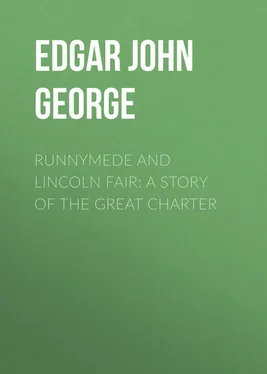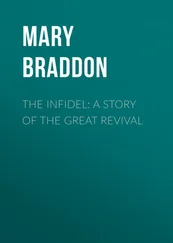John Edgar - Runnymede and Lincoln Fair - A Story of the Great Charter
Здесь есть возможность читать онлайн «John Edgar - Runnymede and Lincoln Fair - A Story of the Great Charter» — ознакомительный отрывок электронной книги совершенно бесплатно, а после прочтения отрывка купить полную версию. В некоторых случаях можно слушать аудио, скачать через торрент в формате fb2 и присутствует краткое содержание. Жанр: foreign_antique, foreign_prose, на английском языке. Описание произведения, (предисловие) а так же отзывы посетителей доступны на портале библиотеки ЛибКат.
- Название:Runnymede and Lincoln Fair: A Story of the Great Charter
- Автор:
- Жанр:
- Год:неизвестен
- ISBN:нет данных
- Рейтинг книги:3 / 5. Голосов: 1
-
Избранное:Добавить в избранное
- Отзывы:
-
Ваша оценка:
- 60
- 1
- 2
- 3
- 4
- 5
Runnymede and Lincoln Fair: A Story of the Great Charter: краткое содержание, описание и аннотация
Предлагаем к чтению аннотацию, описание, краткое содержание или предисловие (зависит от того, что написал сам автор книги «Runnymede and Lincoln Fair: A Story of the Great Charter»). Если вы не нашли необходимую информацию о книге — напишите в комментариях, мы постараемся отыскать её.
Runnymede and Lincoln Fair: A Story of the Great Charter — читать онлайн ознакомительный отрывок
Ниже представлен текст книги, разбитый по страницам. Система сохранения места последней прочитанной страницы, позволяет с удобством читать онлайн бесплатно книгу «Runnymede and Lincoln Fair: A Story of the Great Charter», без необходимости каждый раз заново искать на чём Вы остановились. Поставьте закладку, и сможете в любой момент перейти на страницу, на которой закончили чтение.
Интервал:
Закладка:
“My young master,” said the boy, “the Norman lord is already astir and impatient for thy coming; and since it seems that go to the king’s court thou must – be thou willing or unwilling – I would that I could be permitted to go in thy company.”
“Nay, Wolf, boy,” replied Oliver sadly, “that cannot be. Besides, I know not into what dangers you might be led. For myself, I would ten times rather take my chance again face to face with the Moors and the French than risk all I dread. I know not what snare I may fall into, and your presence would but encumber me in case of the worst.”
Wolf smiled. “Heardest thou never,” asked he, “of the mouse that gnawed the toils of the lion, and set the lion free?”
“I know the fable,” answered Oliver, “and I comprehend your meaning. But I fear me that if I am caught in the toils they will be too tough for thy teeth. So no more of this. Whatever danger may await me I must face alone. But be of good cheer. Should fortune befriend me, as she may chance to do, I will forthwith send for you. Meanwhile, see to my good steed Ayoub, that he be fitly caparisoned to take the road when it pleases my Norman kinsman to place his foot in the stirrup. Begone!”
CHAPTER IV
CHRISTMAS
I HAVE mentioned that, long before Oliver Icingla retired to rest on Christmas Eve, the “Yule log” was placed on the hearth in the old hall of Oakmede. It was an important ceremony with the English of that generation – a ceremony the consequences of which they did not lightly regard. If the log continued to burn during the whole night and through all the ensuing day, the fact of its burning was deemed a happy prognostic for the family; if it was consumed or extinguished, the circumstance of its consumption or extinction was regarded as ominous of evil. Great, therefore, was the consternation in the home of the Icinglas when it was discovered, on the morning of Christmas Day, that the “Yule log” lay on the hearth half consumed, but burning no longer; and the intelligence on being conveyed to Dame Isabel filled her mind with the most gloomy forebodings as to the fate of her son; for the Norman lady, after living long among Saxons, had caught all their superstitions, and she had brooded so long in solitude over her sorrows that she had grown more superstitious than the Saxons themselves.
Oliver Icingla was not much influenced by omens. Still his mind was ill at ease, and he did not think of his journey and its destination without considerable apprehension of suffering for the sake of a kinsman for whom, after the conversation of the previous evening, he had less liking than ever, and on whose conduct he looked with grave suspicion. No sign of apprehension, however, did he allow to escape him; but, having made the necessary preparations for his departure, and instructed Wolf, the varlet, to have the black steed saddled and bridled, he indicated his readiness to take the road as soon as it was De Moreville’s will and pleasure to set forth for London. Grim, haughty, and evincing no inclination to renew the irritating discussion that had been so unpleasantly interrupted, the Norman baron only replied by a nod, but immediately issued such orders as speedily brought his men-at-arms, mounted, into the courtyard, one of them leading the baron’s charger, harnessed and caparisoned.
Before Oliver Icingla departed under De Moreville’s auspices, Dame Isabel, having taken leave of her son, summoned her kinsman to her presence in language which made the haughty Norman soliloquise in a strain much less complimentary to womankind than quite became a man who wore golden spurs and had taken the vows of chivalry.
“Kinsman,” began the lady, taking his hand and keenly scrutinising his countenance as she spoke, “you are about to conduct my son to a place where I cannot but think that he will be much exposed to peril. Bear in mind that I do hold you answerable should evil in consequence befall him.”
“Madame,” replied De Moreville, averting his face with an impatient gesture, “your fears master your judgment.”
“I place my chief affiance in God,” continued the lady, “and my next in you as my kinsman; so deceive me not.”
“Fear nothing, madam,” replied De Moreville, his heart slightly touched; “your son will be as safe as in your own hall.”
“Answer me this question, then,” said Dame Isabel in an earnest and excited tone. “Is it true, or is it not true, that when Llewellyn of Wales gave twenty-eight sons of Welsh chiefs to King John as surety for his good faith, and when Llewellyn afterwards broke into rebellion, King John caused the hostages to be hanged at Nottingham?”
De Moreville was perplexed in the extreme. He felt that he was in a dilemma. If he answered “Yes,” what would that woman think but that he was leading her son away as a sheep is led to the slaughter? If he answered “No,” how pitiful and contemptible would seem the policy of himself and the confederate barons, who had industriously propagated a rumour so damaging to the king’s character for humanity! In his embarrassment De Moreville remained silent.
“My lord, why answer you not?” exclaimed the lady in peremptory accents. “I ask again, is it true, or is it not true, that the Welsh hostages were hanged by command of the king?”
“Madam,” replied De Moreville, when thus pressed, “I know not. I have heard, indeed, that they were hanged, but I cannot speak with certainty as to the truth of the rumour.”
Dame Isabel raised her eyes imploringly to heaven, changed colour, and fell swooning into the arms of her women. Ere she recovered, De Moreville had gained the courtyard, mounted his charger, and, with Oliver riding mutely by his side, taken his way slowly up the glade and over the frost-bound sward towards the great northern road.
And Oliver’s heart was sad; and as he turned his head to look once more at the home of his fathers he could not help contrasting his departure with that which had taken place when, full of life, and hope, and ambition, he left Oakmede, after a brief visit, to embark for Spain. But as the horsemen set their faces towards London his spirits began to rise, for everywhere that day the signs and sounds of joy and rejoicing met the eye and ear, and the faces of the populace of every village and hamlet through which they passed wore an expression of contentment and jollity.
In the reign of King John, indeed, as in modern days, no national holiday nor any festival of the Christian Church was the occasion of so much merriment and festivity in England as Christmas. Even May Day, when the inhabitants of every town and village “brought the summer home,” and lads and lasses danced with jocund glee around the maypole, and even Midsummer Eve, or the vigil of St. John the Baptist, when great fires were kindled to typify the saint of the day, who has been described as “a burning and shining light,” were held to be of quite inferior importance by the people over whom the Plantagenets reigned. Nowhere throughout Europe was Christmas so joyously and so thoroughly celebrated. Other nations in Christendom did, indeed, show their respect for the anniversary of their Redeemer’s birth with sincere and praiseworthy enthusiasm. But between England and other countries there was this remarkable distinction, that while foreigners commemorated the annually returning season chiefly with devotional exercises, Englishmen of all ranks gave themselves up to jollity, and good fellowship, and good cheer.
No sooner, indeed, did the Christmas holidays, after being long wearied for, arrive, than, from Cornwall to the borders of the Tweed, labour ceased and care was thrown to the winds, and from end to end the land rang with gladness and song. On St. Thomas’s Day began the nocturnal music called “waits,” which continued till Christmas, and everywhere carols were trolled and masquerades performed. The towns assumed a sylvan aspect, and the churches were converted into leafy tabernacles, and in the streets standards were set up and decked with evergreens, and around them young and old danced joyously to music.
Читать дальшеИнтервал:
Закладка:
Похожие книги на «Runnymede and Lincoln Fair: A Story of the Great Charter»
Представляем Вашему вниманию похожие книги на «Runnymede and Lincoln Fair: A Story of the Great Charter» списком для выбора. Мы отобрали схожую по названию и смыслу литературу в надежде предоставить читателям больше вариантов отыскать новые, интересные, ещё непрочитанные произведения.
Обсуждение, отзывы о книге «Runnymede and Lincoln Fair: A Story of the Great Charter» и просто собственные мнения читателей. Оставьте ваши комментарии, напишите, что Вы думаете о произведении, его смысле или главных героях. Укажите что конкретно понравилось, а что нет, и почему Вы так считаете.












